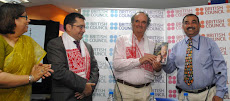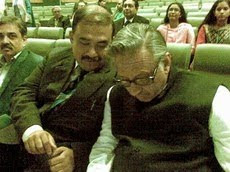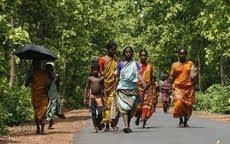After the dust has settled on the Rajkhowa episode, it is time for all sides to think about the next course forward. The Centre and the Assam government made a mess of the situation by circulating lies about Rajkhowa surrendering when he had been actually nabbed at Cox's Bazar after being tailed by the Bangladesh Detective Branch for four days. If Delhi and Dispur wished Rajkhowa to start talks, why did they seek to discredit him by circulating the falsehood of his surrender - he never surrendered. Sources in the Detective Branch and Rapid Action Battalion of Bangladesh who nabbed Rajkhowa make it clear that he was picked up in Cox's Bazar when he was planning to escape to Burma.  Those who know how far Cox's Bazar will understand what I am talking about. I went to Cox's Bazar for my honeymoon in 1991, two months before the seaside resort was all but wiped out by a massive cyclone and tidal wave. I know that area thoroughly well - including the islands around it.
Those who know how far Cox's Bazar will understand what I am talking about. I went to Cox's Bazar for my honeymoon in 1991, two months before the seaside resort was all but wiped out by a massive cyclone and tidal wave. I know that area thoroughly well - including the islands around it.
Rajkhowa did not realise all his four mobiles were tracked by the Detective branch - who were helped by two Indian signals intelligence experts, both working in Indian High Commission under diplomatic cover. There are some army officials in Bangladesh who are very upset with this - they think the Indian intelligence is penetrating the detective branch and working through them to track down Indian militants. Be that as it may, the long and short of the story is that Rajkhowa did not surrender. He tried to escape to Burma though his chances of getting through the Teknaf-Maungdaw border was pretty low because there's heavy presence of border guards on both sides - the BDR and the Burmese NAKASA, because the relations between Burma and Bangladesh is very tense now.
For the whole of 3rd December, the Indian officials tried to pressurise Rajkhowa to get to start talks by dropping the sovereignity demand, Delhi asked Bangladesh to send him to Assam. But by cooking up the surrender story, they have upset Rajkhowa so much that even this rather moderate rebel leader will be unwilling to start talks. The big bosses in Delhi dont often realise that this was the right time when they should have offered talks to the entire leadership - and without pre conditions. Though I cannot be totally sure, I would imagine, having spoken to Paresh Barua twice in recent weeks, that if the talks were without pre-conditions, even he would be willing to start talks.
 Those who know how far Cox's Bazar will understand what I am talking about. I went to Cox's Bazar for my honeymoon in 1991, two months before the seaside resort was all but wiped out by a massive cyclone and tidal wave. I know that area thoroughly well - including the islands around it.
Those who know how far Cox's Bazar will understand what I am talking about. I went to Cox's Bazar for my honeymoon in 1991, two months before the seaside resort was all but wiped out by a massive cyclone and tidal wave. I know that area thoroughly well - including the islands around it.Rajkhowa did not realise all his four mobiles were tracked by the Detective branch - who were helped by two Indian signals intelligence experts, both working in Indian High Commission under diplomatic cover. There are some army officials in Bangladesh who are very upset with this - they think the Indian intelligence is penetrating the detective branch and working through them to track down Indian militants. Be that as it may, the long and short of the story is that Rajkhowa did not surrender. He tried to escape to Burma though his chances of getting through the Teknaf-Maungdaw border was pretty low because there's heavy presence of border guards on both sides - the BDR and the Burmese NAKASA, because the relations between Burma and Bangladesh is very tense now.
For the whole of 3rd December, the Indian officials tried to pressurise Rajkhowa to get to start talks by dropping the sovereignity demand, Delhi asked Bangladesh to send him to Assam. But by cooking up the surrender story, they have upset Rajkhowa so much that even this rather moderate rebel leader will be unwilling to start talks. The big bosses in Delhi dont often realise that this was the right time when they should have offered talks to the entire leadership - and without pre conditions. Though I cannot be totally sure, I would imagine, having spoken to Paresh Barua twice in recent weeks, that if the talks were without pre-conditions, even he would be willing to start talks.
 With much of ULFA funds frozen by Bangladesh - 3990 crore BD Taka in 42 accounts of Sonali Bank- Barua might have little options. The Chinese have not promised him heavens, just given him some hope If he is not interested, why should he be apologising for Dhemaji blasts ? After so many years. Finally Delhi and Dispur have realised what a chance they have missed. Something that was set up for them on a platter by Bangladesh. The feeling now in both capitals, State and Centre, is to wait and watch.
With much of ULFA funds frozen by Bangladesh - 3990 crore BD Taka in 42 accounts of Sonali Bank- Barua might have little options. The Chinese have not promised him heavens, just given him some hope If he is not interested, why should he be apologising for Dhemaji blasts ? After so many years. Finally Delhi and Dispur have realised what a chance they have missed. Something that was set up for them on a platter by Bangladesh. The feeling now in both capitals, State and Centre, is to wait and watch.That is the right thing to do. No hurry, no rush, no shortcuts. These things need a lot of patience and mature planning and solid groundwork. My own feeling is that Delhi and Dispur were neither prepared for this sudden breakthrough. They did not realise Bangladesh would be going so far as to nab the chairman - the feeling was they have caught Sasha Choudhury and Chitrabon Hazarika to make their case for seeking concessions before Prime Minister Hasina's visit. Indian intelligence was not aware that Hasina is not attacking the ULFA under Indian pressure - she has very good reasons to do it for ther own sake. She believes - rightly or wrongly - that the ULFA was used by Bangladesh military intelligence and the BNP to attack the Awami League rally in Dhaka in August 2004 - an attack that killed a lot of senior Awami League leaders and nearly killed her.
In 1997, Hasina started the crackdown on ULFA under Indian request. But after the arrest of Anup Chetia, some senior Awami League and Bangladeshi leftist leaders went to her and argued for sympathetic treatment for the ULFA. Their logic was simple and straight - the ULFA is fighting against Indian exploitation and for Assam's indepedence in much the same way the Bengalis in East Pakistan fought against Pakistan. The classic colonial exploitation thesis. Apparently Hasina bought the logic and did not proceed very much against the ULFA. Hasina has her own mind, her own politics and she cannot be moved very much by any kind of pressure. So after Rajkhowa's handover, Paresh Barua told me in an interview for BBC Bengali service that he did not expect the Awami League to crush "another national movement" next door and under Indian "colonial pressure." He was again pandering to Hasina's politics , which has made her support the cause of Burmese democracy and Aung Sang Suu Kyi immediately after becoming Prime Minister - at a time when democratic India is playing goodie-goodie with the generals in Rangoon.
 The ULFA must realise it has lost two major trans-border base areas - Bhutan and Bangladesh. Burma's remote Sagaing does provide some hope but that's an area the ULFA does not find it easy to maintain bases. The ULFA has two options - either join up with the Indian Maoists, which the Manipuri PLA is persuading it to do , and create a broad anti-Delhi front , to continue the struggle . But Paresh Barua does not trust the Maoists very much because he senses they may hijack his struggle.
The ULFA must realise it has lost two major trans-border base areas - Bhutan and Bangladesh. Burma's remote Sagaing does provide some hope but that's an area the ULFA does not find it easy to maintain bases. The ULFA has two options - either join up with the Indian Maoists, which the Manipuri PLA is persuading it to do , and create a broad anti-Delhi front , to continue the struggle . But Paresh Barua does not trust the Maoists very much because he senses they may hijack his struggle. Barua is a military minded guerrilla leader. He has little patience for the Marxist-Leninist and Mao thought and all the polemical debates the Maoists engage in. He likes to keep to his politics simple. That is said to be reason why he slowly discontinued the ULFA's initial practice of political commissars. NGOs and rights activists who have been close to ULFA resent Barua's style and blame him for not allowing them to launch strong democratic struggles on local issues.
Barua is a military minded guerrilla leader. He has little patience for the Marxist-Leninist and Mao thought and all the polemical debates the Maoists engage in. He likes to keep to his politics simple. That is said to be reason why he slowly discontinued the ULFA's initial practice of political commissars. NGOs and rights activists who have been close to ULFA resent Barua's style and blame him for not allowing them to launch strong democratic struggles on local issues.But if Barua and his field commanders are not keen on an alliance with the Maoists, I dont think they have very much choice but talk to Delhi. China has been testing the waters and they may be training a few ULFA guerrillas for limited purpose disturbance but they are still not given any indication to revive the ULFA movement in a significant way. And China does not have a direct border with Assam. As Bangladesh had with India or even Mizoram with east Pakistan.
So at the end of the day, Paresh Barua will have to deal with India - either on the table of talks with the government in Delhi and Dispur or strike an alliance with Indian Maoists, atleast for tactical reasons. The days when he or the ULFA can strike it out on their own with some foreign support is perhaps over.
Photos : AP and Reuters
( Subir Bhaumik is the BBC's East India Correspondent and a known Northeast India specialist )







